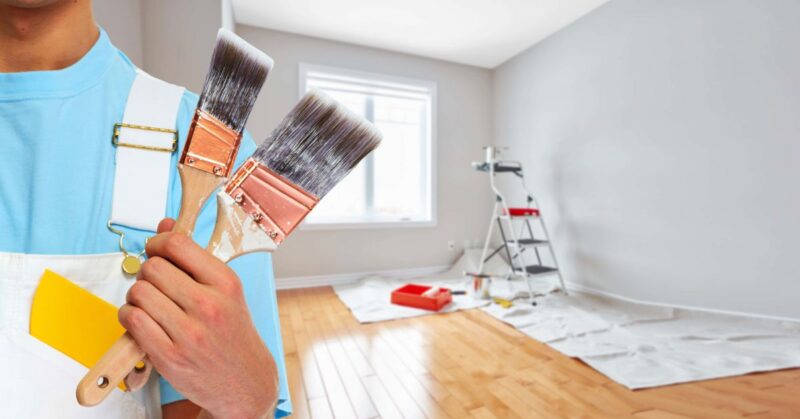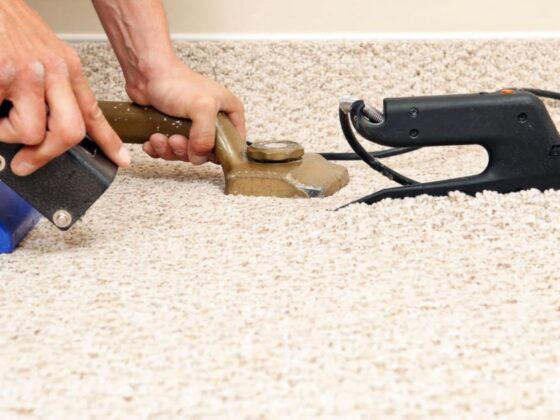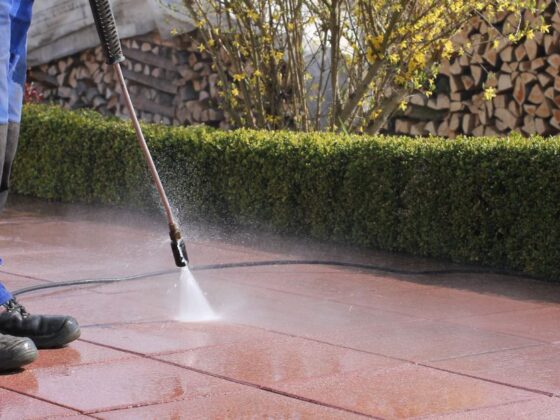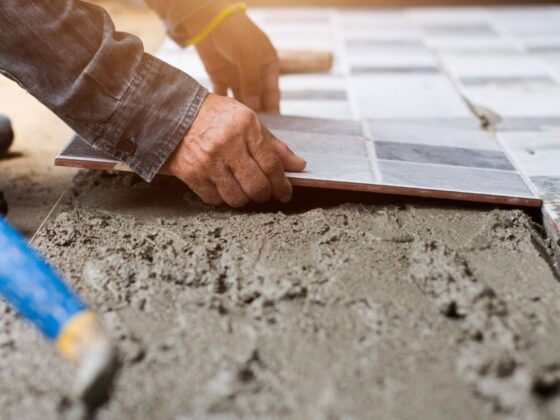If you’re thinking of enhancing the aesthetics, hiding imperfections, and improving the air quality of your home, consider doing interior painting. But the question is, how much does it Cost To Paint Interior Of House? According to recent surveys and reports, interior house painting can cost between $1.50 and $6 per square foot, depending on key elements such as paint type and quality, area size, and the type of surfaces involved.
Estimating this cost can be frustrating due to such varying prices and unclear estimates. So, below is a complete breakdown of the interior painting cost and the factors impacting its price. We’ll also share some useful tips on how can you save on interior painting. So, let’s get started.
Cost To Paint Interior Of House In 2025
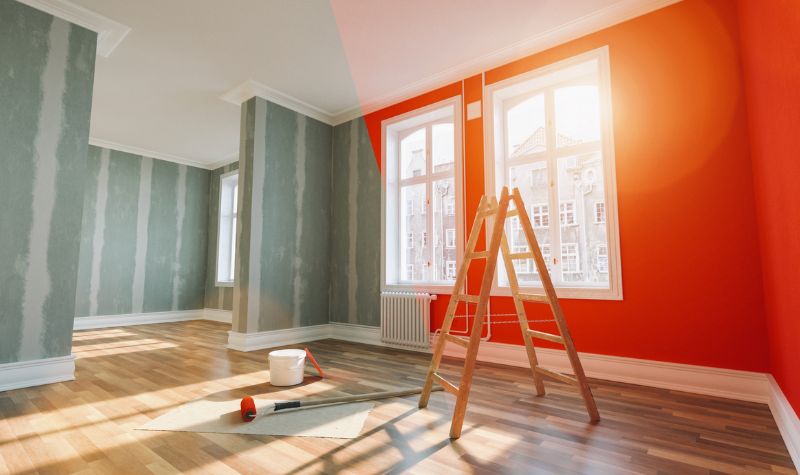
The cost to paint a house interior ranges between $300 to $6,800, and more, depending on your project scope, complexity, and more. However, the national average cost ranges between $2,500 to $12,000.
1. Cost To Paint Interior Of House By Square Foot
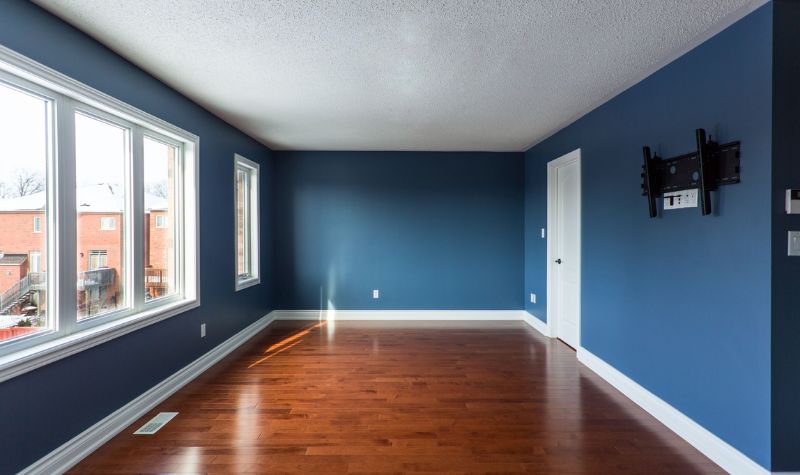
The painting cost for house interior greatly depends on the square footage. For example, a small 500 square foot apartment may cost you between $1,000 and $2,500, while a 3000 square foot spacious house may cost you $8,000 to $15,000 for interior painting, depending on the paint quality and home details.
| House Size (sq ft) | Average Cost | Notes |
|---|---|---|
| 500 | $1,000–$2,500 | Small studio or apartment; includes walls, ceilings, and trim. |
| 1,000 | $2,000–$5,000 | One-bedroom home; basic prep and standard paint quality. |
| 1,500 | $3,500–$7,500 | Two-bedroom house; may include minor repairs. |
| 2,000 | $5,000–$10,000 | Average family home; covers walls, ceilings, and trim. |
| 2,500 | $6,500–$12,500 | Larger home; higher costs with detailed trim or high ceilings. |
| 3,000 | $8,000–$15,000 | Spacious home; may require scaffolding for tall rooms. |
2. Cost To Paint Interior By House Type
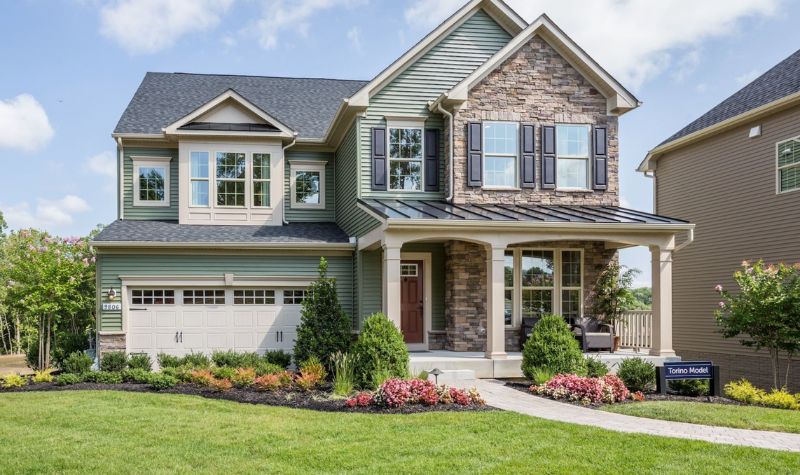
The average cost to paint a whole home’s interior also varies depending on the house type and size because different homes have different needs and complexities.
| House Type | House Size (sq ft) | Average Cost | Notes |
|---|---|---|---|
| Apartment | 900–1,500 | $900–$3,000 | Includes walls, ceilings, and trim; costs vary with landlord permissions. |
| Condo | 600–1,300 | $1,800–$5,000 | One or two bedrooms; higher costs with detailed finishes or HOA restrictions. |
| Multi-Level Single Family | 2,000–3,500 | $5,500–$12,000 | Larger homes with multiple levels; costs increase with staircases and high ceilings. |
| Single-Family Home | 1,500–2,500 | $3,500–$10,000 | Includes walls, ceilings, and trim; larger homes or high ceilings increase costs. |
| Townhouse | 1,200–2,000 | $2,500–$7,500 | Multi-level with shared walls; costs rise with staircases or intricate trim. |
3. Cost To Paint House Interior By Room
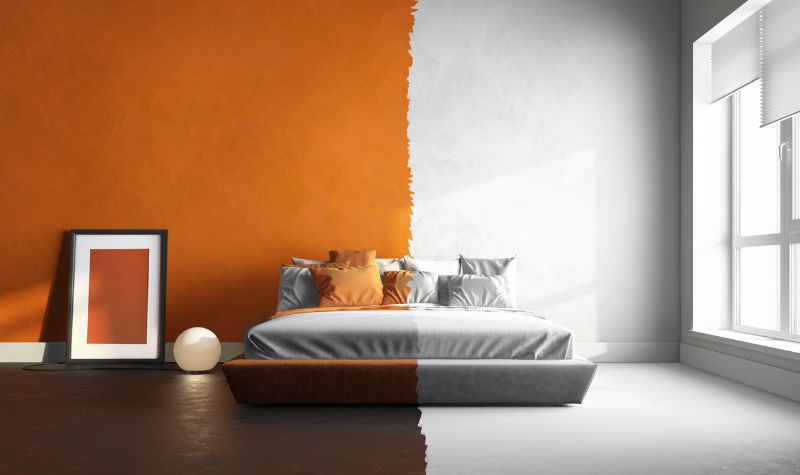
The cost to paint a room varies depending on its type, size, and features. For example, a primary bedroom with a size of 100 to 300 square feet may cost you $650 to $1,400, while a kitchen with a size of 100 to 150 square feet may cost you only $150 to $250 for ceiling paint. Keep in mind that the following prices may change depending on other factors like paint type, quality, and surface involved.
| Room Type | Room Size (sq ft) | Average Cost | Notes |
|---|---|---|---|
| Bathroom | 30–100 | $225–$650 | Small paintable area due to tiles; includes ceiling and walls; higher costs with moisture-resistant paint. |
| Bedroom | 100–300 | $350–$1,400 | Small rooms $350–$850; master bedrooms $650–$1,400; includes walls, trim, and ceiling; costs vary with size and prep. |
| Dining Room | 100–200 | $380–$675 | Small to medium size; includes walls and trim; simpler layout reduces labor costs. |
| Hallways / Entryways | 50–200 | $200–$800 | Narrow or open spaces; includes walls and trim; costs increase with height or detailed molding. |
| Kitchen | 100–150 | $150–$250 | Small paintable wall area due to cabinets; includes ceiling; may require durable, stain-resistant paint. |
| Living Room | 200–450 | $600–$2,000 | Larger space; includes walls, ceiling, and trim; costs rise with high ceilings or attached areas. |
4. Cost To Paint Interior Of House By Surface
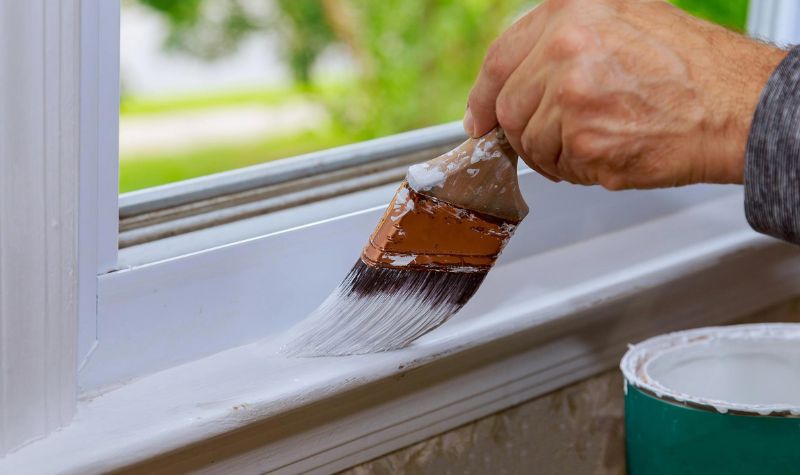
When painting the interior during renovations or after home building, the involved surfaces play a crucial role in deciding the overall painting cost. Each surface has a different cost due to complexity and prep work, including trim, ceilings, walls, cabinets, doors, and windows. Some surfaces, like walls, are easy to paint, while doors can be tougher to paint.
| Surface Type | Average Cost | Notes |
|---|---|---|
| Cabinets | $200–$1,200 | Per set (10–20 units); includes prep, sanding, and multiple coats; costs vary with material and complexity. |
| Ceilings | $150–$500 | Per room (100–400 sq ft); costs rise with texture or height requiring ladders/scaffolding. |
| Crown Moldings | $1–$5 per linear ft | Cost varies with length and detail; includes caulking and painting; average home needs 50–150 ft. |
| Doors | $50–$150 | Per door; includes prep and two coats; higher costs with detailed designs or oil-based paint. |
| Trim/Baseboards | $1–$4 per linear ft | Cost varies with length and detail; includes caulking and painting; average home needs 200–400 ft. |
| Walls | $1–$2 per sq ft | Based on surface area; increases with texture or multiple coats for color change. |
| Windows | $30–$100 | Per window; includes frames and sills; costs vary with size and trim complexity. |
5. Cost To Paint Interior Of House By Paint Type
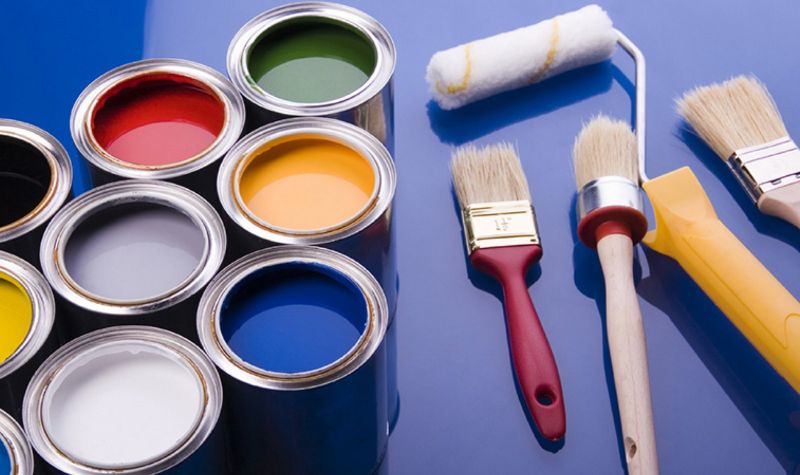
Paint prices can vary by brand and quality, as many types of paints are available to choose from, as on your needs. Paint costs $20 to $85 per gallon, covering almost 200 to 450 square feet.
Carefully choose the paint type where it is needed. For example, latex is a water-based paint which is versatile for walls and ceilings, while oil-based paint is best for trim and high-wear surfaces. Moreover, each paint type has a further quality breakdown, including budget, standard, and premium, with some price differences.
| Paint Type | Average Cost (per gallon) | Notes |
|---|---|---|
| Chalk Paint | $30–$60 | Ideal for furniture and distressed finishes; requires sealing; moderate labor for application. |
| Enamel Paint | $35–$70 | Suitable for trim and doors; durable, glossy finish; higher labor due to longer drying time. |
| Flat/Matte | $30–$45 | Best for low-traffic areas like ceilings; hides imperfections but less washable; average labor cost. |
| High-Gloss | $50–$85 | Best for cabinets and furniture; very durable, reflective; higher labor due to prep and coats. |
| Latex Paint | $25–$50 | Versatile for walls and ceilings; water-based, quick-drying; low to moderate labor impact. |
| Oil-Based Paint | $40–$75 | Ideal for trim and high-wear surfaces; durable, smooth finish; higher labor due to ventilation needs. |
| Primer | $20–$40 | Used as base coat; enhances adhesion and coverage; labor cost included with topcoat application. |
| Satin | $40–$65 | Ideal for kitchens and bathrooms; moisture-resistant and durable; may need extra prep. |
| Semi-Gloss | $45–$75 | Suitable for trim and doors; high durability, easy to clean; slightly higher labor for edges. |
Factors Impacting Interior House Painting Cost
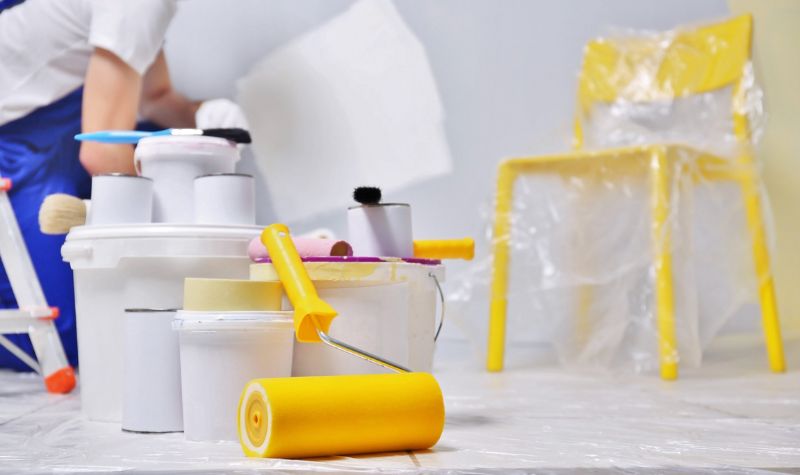
Apart from square feet, house type, surfaces involved, paint type, and room type, several other key factors impact the cost to paint interior of house. Understanding these elements can help you make a more informed estimate.
| Factor | Impact on Cost | Notes |
|---|---|---|
| Access Difficulty | 10%–30% increase | Hard-to-reach areas (e.g., high ceilings, tight corners) require ladders or scaffolding, adding labor time. |
| Accent Wall | 10%–20% increase | Focus on one wall with premium paint or techniques; adds labor and material costs. |
| Labor Rates | $20–$50/hour | Varies by region and painter experience; higher rates in urban areas or for skilled professionals. |
| Moving Furniture | $100–$300 | Additional fee if contractor moves heavy items; DIY can avoid this cost. |
| Number of Coats | 20%–40% increase per extra coat | Multiple coats for color changes or coverage; increases material and labor expenses. |
| Paint Quality | 10%–50% increase | Higher quality (e.g., premium vs. budget) raises material costs; better durability may reduce future repaints. |
| Prep Work | 20%–40% of total cost | Includes cleaning, patching, sanding, and removing old finishes; poor wall condition raises expenses. |
| Seasonal Timing | 5%–15% savings | Off-season (late fall/winter) painting can reduce costs due to lower demand for contractors. |
| Textured Wall | 15%–35% increase | Requires more paint and labor for even coverage; complex textures add to prep time. |
| Wallpaper Removal | $1–$3 per sq ft | Cost depends on wallpaper type and wall condition; includes labor for stripping and repair. |
1. Access Difficulty
The hard-to-reach areas, like high ceilings and tight corners, can impact the cost by 10 to 30% to paint the inside of a house. These areas require ladders or scaffolding, which increases cost. For example, a 12-foot ceiling might add 15 to 20% to the cost, compared to an 8-foot ceiling.
2. Accent Wall
You may also add an accent wall to your master bedroom, which may increase the price by 10% to 20% due to special paint or techniques. For example, adding a bold red accent wall could add around 15% to the total room painting cost.
3. Labor Rates
Labor rates for house interior painting range between $20 to $50 per hour, depending on the area and the painter’s skills. Hiring a professional may cost you a bit more than the overall painting project cost, but they can properly do tasks like cleaning, patching, sanding, and caulking. However, you may save this amount by doing a painting DIY, if you’re an experienced one.
4. Moving Furniture
Before painting, moving the furniture and covering it with protective plastic and tarps is mandatory. Your contractor might charge you an extra $100 to $300, but you can save by doing it yourself.
5. Number of Coats
The number of coats also affects the cost to paint interior of a house. Consider adding 20 to 40% per extra coat, especially for new colors. One coat is sufficient for refreshing an existing color. However, two coats are necessary for changing colors or covering dark surfaces.
For example, the specific color change, like from dark blue to soft beige, may require two coats for a smooth finish, adding almost 30% to the overall cost.
6. Paint Quality
It’s important to choose the paint quality wisely if you want your paint to last and look better longer. From vintage interior designs to today’s trendy interior style, wabi sabi interior designs are now focusing on using premium quality paints. These paints may cost 10 to 50% more upfront. Lower-quality paints may save you money but may not look as good, resulting need for more frequent repainting.
7. Prep Work
Your existing paint surface condition impacts 20 to 40% of the total cost. This work includes small house fixing tasks like cleaning and sanding for proper adhesion, repairing damages like holes and cracks, priming for tricky surfaces or stains, and filling and sanding dents and nail holes. This pre-work is essential for a flawless finish.
8. Seasonal Timing
Seasonal timing also impacts 5 to 15% of the painting cost because painting in off-season, like late fall or winter, can reduce costs due to lower demand for contractors.
9. Textured Walls
Having a textured wall can increase costs by 15 to 35% due to the need for more paint and specialized application techniques. For example, a popcorn ceiling might add 25% to the cost.
10. Wallpaper Removal
Removing the wallpaper before painting the space may cost you $1 to $3 per square foot, depending on how tough it is to strip. You can expect to pay around $200 for removing wallpaper from a 100 square foot wall.
Key Tips For Saving On The Cost of Interior House Painting
You can save money on your interior house painting project by following the tips below.
- Handle some or all of the prep work and surfaces yourself, like cleaning, trimming shrubs, sanding, patching, fixing drywall, and taping baseboards and outlets, to reduce labor costs.
- Consider getting the house rewiring if it’s required before painting the interior.
- Move and cover furniture yourself before painting.
- Lay down tarps to protect floors and carpets
- Get multiple quotes from licensed and insured painters, specifying hours, products, and costs.
- Choose one color for the rooms.
- Buy paint in bulk for discounts.
- Use premium paints for better coverage and durability. Consider generic or store-brand paints for lower costs.
- Use cheaper paint for areas that don’t get much use.
- Time your painting project strategically during off-peak seasons for lower costs.
- Trim the job scope to save costs by skipping non-essential areas like closet interiors or ceilings.
- Touch up the most noticeable areas.
You can also save some money by painting the interior of your house yourself, as well as doing all the prep work. Home renovation software tools can also be used to get some help regarding choosing the right color. But it’s only recommended when you’re an experienced DIYer.
Cost To Paint a Room Yourself?
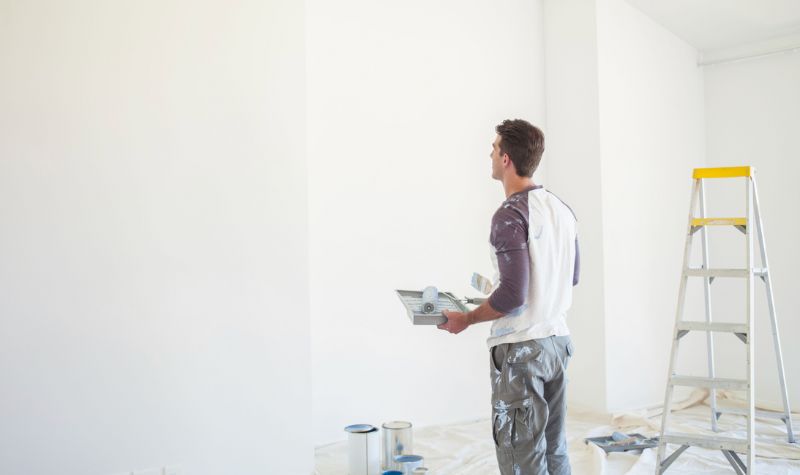
DIY room painting costs range between $128 to $435, and more, including materials and paint, depending on your paint type and area. To paint yourself, make sure to arrange the below required materials.
| Material | Average Cost |
|---|---|
| Brushes | $5–$20 |
| Cleaning Supplies | $5–$15 |
| Drop Cloths | $10–$30 |
| Extension Pole | $10–$30 |
| Ladder | $30–$150 |
| Paint | $25–$85 |
| Painter’s Tape | $5–$15 |
| Primer | $20–$40 |
| Putty/Knife | $5–$15 |
| Rollers | $5–$15 |
| Sandpaper | $5–$10 |
| Tray/Liner | $3–$10 |
| Total DIY Painting Materials Costs | $128–$435 |
Steps For Painting DIY
To paint a room yourself, start by choosing your colors and buying the necessary materials like paint, primer, sandpaper, tape, and other supplies from the list above for prep work. Now, prep the room by cleaning the walls, moving furniture, and covering things with drop cloths.
Cover the electric outlets and apply tape to the edges and corners. Now, paint with primer and multiple coats if required. Finally, touch up baseboards and trim, and clean up after the paint dries.
Interior House Painting DIY vs Hiring A Pro
Interior Painting yourself might seem great at first, but it can take a lot of time and might not look perfect. However, it’ll only cost you between $128 to $435, but you might not be happy with the expected results and outcome. Also, try to avoid DIY painting during gut renovation as it can also lead to mistakes and costly fixes.
On the other hand, hiring a professional painter may cost you between $50 to $150 per hour, spending on his experience, but will give you a smooth, streak-free finish and save you time. He’ll handle everything, so you can just relax and enjoy your freshly painted home.
Conclusion
The average cost to paint interior of house range between $1.50 and $6 per square foot, depending on some key factors like paint type, quality, size, and surface. You may save some by doing DIY some or all of the painting work, but it’s recommended to hire a professional. Just get multiple quotes from different contractors and try to do it in off season to reduce interior house painting cost.
Frequently Asked Questions (FAQs)
How Much Does It Cost To Paint A 12×12 Room?
Painting a 12×12 room costs between $300 to $950, depending on paint type, quality, and extras like trim or ceilings. You’ll need almost 3 gallons of paint for two coats.
How Long Does It Take to Paint A House Interior?
DIY interior house painting may take 1 to 4 weeks depending on area and your experience. Professional painters can paint in 2 to 8 days, depending on your project scope.
Can I Paint My Home’s Interior Myself?
Yes, you can paint your home’s interior yourself to save on labor costs. Simply move your furniture, prepare the surface for painting, apply primer, paint multiple coats if need. However, it requires significant time, effort, and resources.
When is the Best Time to Paint Your House Interior?
Try to schedula interior painting in early spring or late winter, due to cooler temperatures and lower humidity. These elements help paint dry faster and adhere. Winter also offers lower rates and deals on painting materials.
How Much Should It Cost To Paint The Interior Of A 2000 Square Foot House?
Painting the interior of a 2,000 square foot home will cost $5,300, depending on several factors, like the quality of paint, the complexity of the job, and the contractor’s labor costs.


